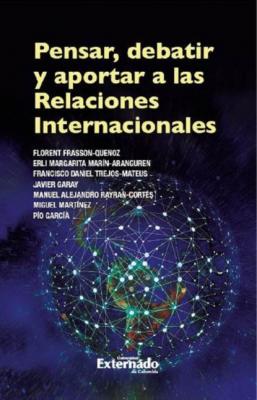ТОП просматриваемых книг сайта:
Pensar, debatir y aportar a las relaciones internacionales. Varios autores
Читать онлайн.Название Pensar, debatir y aportar a las relaciones internacionales
Год выпуска 0
isbn 9789587904338
Автор произведения Varios autores
Жанр Социология
Издательство Bookwire
BUZAN, B. y LAWSON, G. (2015). The Global Transformation: History, Modernity and the Making of International Relations. Cambridge: Cambridge University Press.
BUZAN, B. y WÆVER, O. (2006 [2003]). Regions and Powers: The Structure of International Security. Cambridge: Cambridge University Press.
CABRAL, A. (1966). The Weapon of Theory (Discurso pronunciado durante la Primera Conferencia Tricontinental de los Pueblos de Asia, África y America Latina). La Habana.
CÉSAIRE, A. (1959 [1939]). Cahier d’un retour au pays natal. Paris: Présence Africaine.
DEER, C. (2008). Doxa. En M. Grenfeld (ed.), Pierre Bourdieu: Key concepts (pp. 119-130). Stocksfield: Acumen.
DELVEN, B., JAMES, P. y ÖZDAMAR, Ö. (2005). The English School, International Relations, and Progress. International Studies Review, 7, 171-197.
DIAWARA, M. (1990). Reading Africa through Foucault V. Y. Mudimbe’s reaffirmation of the subject. October, 55, 79-92.
DIOP, A. (1947). Niam n’goura ou les raisons d’être de Présence Africaine. Présence Africaine, 1(1), 7-14.
DIOP, C. A. (2000 [1954]). Nations nègres et culture: de l’Antiquité égyptienne aux problèmes culturels de l’Afrique noire d’aujourd’hui. Paris: Editions Présence Africaine.
DIOP, C. A. (1967). Antériorité des civilisations nègres : mythe ou réalité historique ? Paris: Présence Africaine.
DIOP, C. A. (1982 [1979]). L’Unité culturelle de l’Afrique noire. Paris: Editions Présence Africaine.
DUBAR, C. (2007). Les sociologues face au langage et à l’individu. Langage et société, 3(121-122), 29-43.
DUNNE, T. (2018). Ethical foreign policy in a multipolar world. En C. Brown y R. Eckersley (eds.), The Oxford Handbook of International Political Theory. Oxford: Oxford University Press. 10.1093/oxfordhb/9780198746928.013.36
DUNNE, T. y REUS-SMIT, C. (2017). The Globalization of International Society. Oxford: Oxford University Press.
ELDEM, E. (2018). L’Empire Ottoman et la Turquie face à l’Occident. Introducción. Cours enseignés au Collège de France. Recuperado de https://www.college-de-france.fr/site/edhem-eldem/course-2017-2018.htm
ENLOE, C. (2014 [1990]). Bananas, Beaches and Bases. Making Feminist Sense of International Politics. Berkley, Los Angeles, London: University of California Press.
ENLOE, C. (2004). Gender is not enough: The need for a feminist consciousness. International Affairs, 80, 95-97. doi:10.1111/j.1468-2346.2004.00370.x
FANON, F. (2002 [1961]). Les damnés de la terre. Paris: La découverte.
FRASSON-QUENOZ, F. (2016). Latin American thinking in international relations reloaded. OASIS, 23, 53-75. http://dx.doi.org/10.18601/16577558.n23.04
FRASSON-QUENOZ, F. (2018). Doxa y heterodoxias en Relaciones Internacionales. Un acercamiento sociohistórico al pensamiento científico. En F. Frasson-Quenoz et. al., Teorías sobre relaciones internacionales. Perspectivas y lecturas desde América Latina. Bogotá: Universidad Externado de Colombia.
GLASER, C. L. y KAUFFMANN, C. (1998). What is the offense-defense balance and can we measure it? International Security, 22(4), 44-82.
GUERRA, F.-X. (1992). Modernidad e independencias. Ensayos sobre las revoluciones hispánicas. Madrid: MAPFRE.
GUZZINI, S. (1993). Structural power: The limits of neorealist power analysis. International Organization, 47(3), 443-478.
HAGMANN, J. y BIERSTEKER, T. J. (2014). Beyond the Published Discipline: Toward a Critical Pedagogy of International Studies. European Journal of International Relations, 20(2), 291-315.
HANSEN, L. (2015). Ontologies, epistemologies, methodologies. En L. J. Shepherd (ed.), Gender Matters in Global Politics. A Feminist Introduction to International Relations (pp. 14-23). New York: Routledge.
HARDING, S. (1986). The Science Question in Feminism. Ithaca, London: Cornell University Press.
HARDY, C. (2008). Hysteresis. En M. Grenfeld (ed.), Pierre Bourdieu: Key concepts (pp.131-148). Stocksfield: Acumen.
HORTON, J. A. (1969 [1868]). West African Countries and Peoples. Edinburgh: University Press of Edinburgh.
HOUNTONDJI, P. J. (1996 [1983]). African Philosophy: Myth and Reality. Bloomington: Indiana University Press.
HOUNTONDJI, P. J. (1991). African philosophy: Myth and reality. En T. Serequeberhan (dir.), African Philosophy, The Essential Readings. St. Paul: Paragon House.
HOWLETT, M.-V. y FONKOUA, R. (2009). La maison Présence Africaine. Présence Africaine, 10(especial), 106-133.
IKENBERRY, G. J. y MASTANDUNO, M. (eds.) (2003). International Relations Theory and the Asia-Pacific. New York: Columbia University.
INSIGHT CRIME (2018). Brazil Homicides Reach New Record Levels: Report. Recuperado de https://www.insightcrime.org/news/brief/brazil-homicides-new-record-levels-report/
JACKSON, P. T. (2011). The Conduct Of Inquiry in International Relations. Philosophy of Science and its Implications for the Study of World Politics. London: Routledge.
JAGGAR, A. M. (1983). Feminist Politics and Human Nature. London: Harvest Press.
KI-ZERBO, J. (1957). Histoire et conscience nègre. Paris: Présence Africaine.
KI-ZERBO, J. (2011 [1978]). Historia del África Negra. De los orígenes a las independencias. Barcelona: Edicions bellatierra.
LAVINAS PICQ, M. y THIEL, M. (eds.) (2015). Sexualities in World Politics. How LGBTQ Claims Shape International Relations. Oxon: Routledge.
LEHMANN, K. E. (2017). Is regionalism still a viable option for the creation and maintenance of peace and security in Latin America? En M. A.G. Suarez, R. Duarte Villa y B. Weiffen (eds.), Power Dynamics and Regional Security in Latin America. London: Palgrave Macmillan.
LINKLATER, A. y SUGANAMI, H. (2006). The English School of International Relations. A Contemporary Reassessment. Cambridge: Cambridge University Press.
MCSWEENEY, B. (1996). Identity and security: Buzan and the Copenhaguen school. Review of International Studies, 22(1), 81-93.
MEARSHEIMER, J. J. (2001). The Tragedy of Great Power Politics. New York: W. W. Norton.
MEARSHEIMER, J. J. (2016). Benign Hegemony. International Studies Review, 18(1), 147-9.
MEARSHEIMER, J. J. y WALT, S. (2013). Leaving theory behind: Why simplistic Hypothesis testing is bad for International Relations. European Journal of International Relations, 19(3), 427-457. https://doi.org/10.1177/1354066113494320
MIGNOLO, W. D. (2018). Decoloniality and phenomenology: The geopolitics of knowing and epistemic/ontological colonial differences. The Journal of Speculative Philosophy, 32(3), 360-387.
NKRUMAH, N. (1998 [1963]). Africa Must Unite. London: Panaf.
NYE, J. S. JR. (2004). Soft Power: The Means to Success in World Politics. New York: Public Affairs.
PATTERSON,

